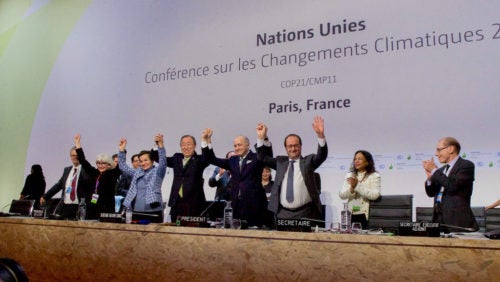The Difficulties of Enforcing Global Environmental Law
February 1, 2019 by Taylor Kilduff

Several world leaders meet at the UN in Paris. Some have their hands linked and raised above their heads. Two others are clapping.
This post seeks to understand what caused the results of a recent United Nations (UN) report on the international environmental rule of law and outline the international community’s difficulties in implementing and enforcing environmental regulations. Both the domestic politics of individual states and the inherent nature of the international community contribute to the inability of international organizations like the UN to enforce environmental standards on a global scale.
There has been a marked rise in cooperative international efforts to protect and preserve the global environment in the last few decades.[1] This trend is evidenced by agreements such as the 1972 Stockholm Declaration on the Human Environment, the 1987 Montreal Protocol banning the use of Chlorofluorocarbons (CFCs), the 1997 Kyoto Protocol seeking to reduce greenhouse emissions and combat climate change, and its successor, the Paris Agreement. Moreover, the need for international cooperation in environmental protection and regulation becomes even more salient when one considers the existential threat of anthropogenic climate change and the potentially catastrophic consequences that humanity will face in the twenty-first century and beyond. According to a United Nations (UN) report, despite continued effort by international bodies at setting global standards for environmental protections and greenhouse gas reduction, these international environmental laws are facing a problem[2] that is relatively common to international legal frameworks—lack of sufficient enforcement methods.[3]
In January of 2019, the UN released a global assessment on the environmental rule of law, the first ever report of this kind.[4] What they found was that despite a substantial increase in the amount of environmental protection agencies and laws, widespread failure to adequately enforce regulations has impeded the international effort to combat numerous environmental threats.[5] While the news issued by this report is undoubtedly concerning for the future of the planet, it is unlikely to be surprising to those familiar with the history and operation of international law. Lack of sufficient enforcement mechanisms is an issue that has affected international bodies and agreements throughout the twentieth century and this issue continues to frustrate the international community’s efforts to implement effective global policy in the twenty-first century.[6]
The UN report uses stark language to describe the failure of states to enforce the existing international environmental standards, going so far as to suggest that environmental laws, which have multiplied in number dramatically in recent years, nonetheless “exist mostly on paper” due to insufficient implementation and enforcement.[7] This problem can be seen as one that has two layers. On the top layer are international bodies like the UN and the difficulty such international organizations face in enforcing international rules on individual member states.[8] The second layer of this issue is the individual states, who arguably suffer less from lack of ability to enforce environmental regulations, but more so a lack of motivation to implement potentially costly regulations with no guarantee that other states will follow suit.[9]
The international community’s lack of ability to enforce global environmental law stems, at least in part, from the reluctance of individual states to surrender sovereignty to international organizations.[10] Because of this reluctance, international environmental agreements, like the Paris Agreement, are often voluntary in nature and thus the UN does not have the authority to compel individual signatories to follow the provisions of such agreements.[11] Moreover, the governments of individual states who signed on to the Paris Agreement may be reluctant to vigorously enforce its provisions knowing that there is no guarantee that all signatories will do the same.[12] On top of this uncertainty, the cost of implementing rigorous environmental standards may be untenable to governments where noncompliance could save them substantial costs.[13]
In conclusion, the failure to enforce the global environmental rule of law is based, at least in part, upon issues of the individual state and international level. Lack of ability and, in some cases, motivation to effectively implement these policies on an individual state level, and lack of effective enforcement mechanisms on the international level both contribute to the global community’s failure to enforce the environmental rule of law, as documented in the UN report.[14]
[1] Tseming Yang & Robert V. Percival, The Emergence of Global Environmental Law, 36 Ecology L.Q. 615, 627 (2009).
[2] United Nations Envtl. Programme [UNEP], Environmental Rule of Law First Global Report (2019). https://wedocs.unep.org/bitstream/handle/20.500.11822/27279/Environmental_rule_of_law.pdf?sequence=1&isAllowed=y
[3] See Matus Stulajter, Problem of Enforcement of an International Law Analysis of Law Enforcement Mechanisms of the United Nations and the World Trade Organization, J. of Mod. Sci. 325, 326 (2017).
[4] Environmental Rule of Law First Global Report, supra note 2, at vii.
[5] Id. at 3.
[6] See Andrew Guzman, The Consent Problem in International Law, UC Berkeley: Berkeley Program in L. & Econ., at 15-17 (2011).
[7] Environmental Rule of Law First Global Report, supra note 2,at 3.
[8] See generally supra note 3
[9] See supra note 6,at 15.
[10] Oona A. Hathaway, International Delegation and State Sovereignty, 71 L. & Contemp. Probs. 115, 116 (2007).
[11] Annalisa Savaresi, The Paris Agreement: A New Beginning?, 34.1 J. of Energy & Nat. Resources L. 16, 17 (2016).
[12] Cf. supra note 6,at 15-17.
[13] Environmental Rule of Law First Global Report,supra note 2, at 31.
[14] Id.

